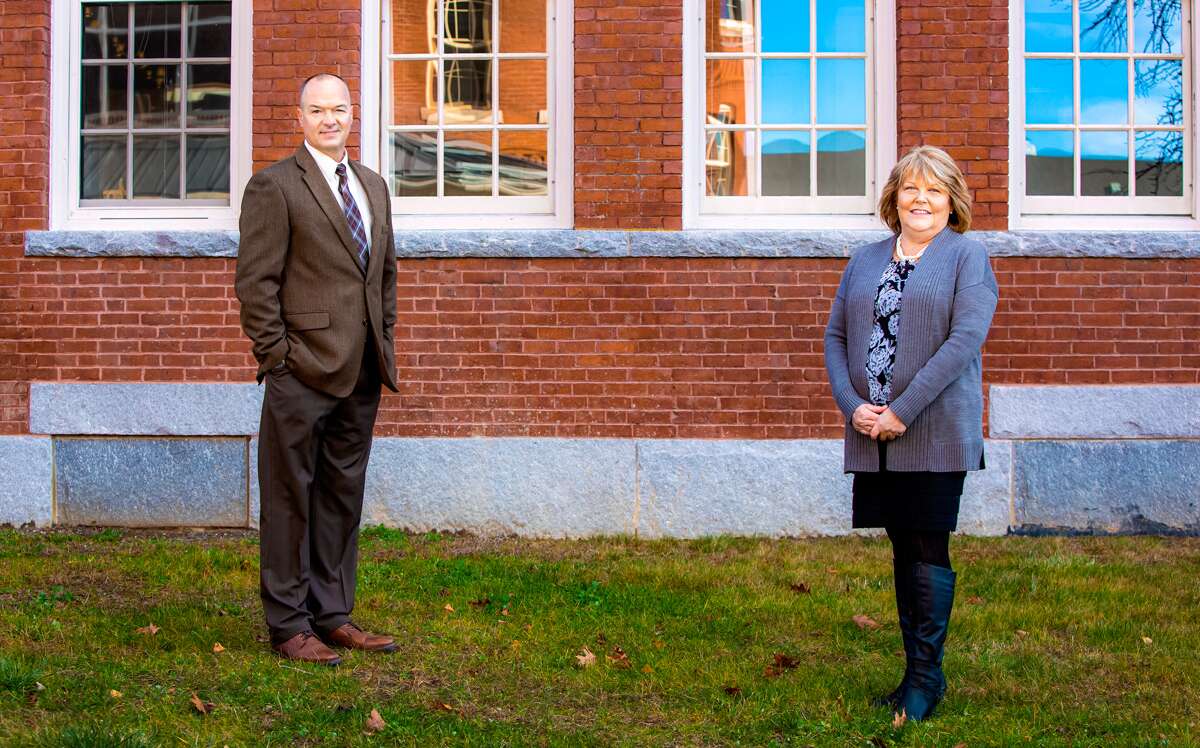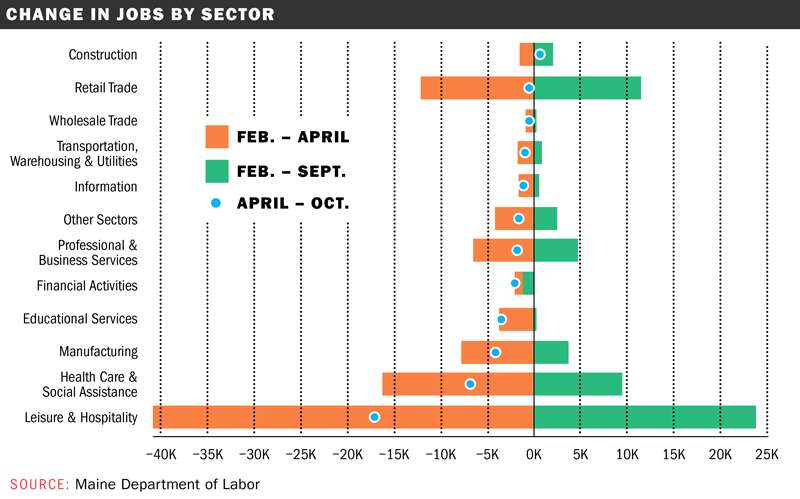
Processing Your Payment
Please do not leave this page until complete. This can take a few moments.
- News
-
Editions
View Digital Editions
Biweekly Issues
- December 1, 2025
- Nov. 17, 2025
- November 03, 2025
- October 20, 2025
- October 6, 2025
- September 22, 2025
- + More
Special Editions
- Lists
- Viewpoints
-
Our Events
Event Info
Award Honorees
- Calendar
- Biz Marketplace
Getting the job done: As the economy recovers, Maine employers are hiring
 Photo / Tim Greenway
Fortunat Mueller, co-founder of ReVision Energy, talks to Jeremy Maisonave, a recent graduate of the ReVision Energy Technical Center, at a ReVision Energy residential solar project in South Portland.
Photo / Tim Greenway
Fortunat Mueller, co-founder of ReVision Energy, talks to Jeremy Maisonave, a recent graduate of the ReVision Energy Technical Center, at a ReVision Energy residential solar project in South Portland.
“If you have integrity, courage, commitment … let’s talk,” the Maine Department of Corrections beckons on its website’s career opportunities section.
As of early December it had 45 vacancies, including 37 correctional officers but also an English teacher at the Long Creek Youth Development Center in South Portland — a good indication of the range of jobs in the state’s prison and juvenile detention system. It’s currently responsible for 1,750 inmates and 6,700 individuals on probation.
The department’s workforce of 1,075 people consists of 456 correctional or juvenile officers and more than 100 supervisory staff. The remaining jobs range from intelligence and clerical positions to food service, plumbers and vocational instructors.
“These jobs are good jobs,” says Commissioner Randall Liberty, who has led the department for two years under Gov. Janet Mills. “They’re recession-proof and they come with state retirement benefits. It’s a great opportunity to not only land a job, but also to progress and to have a career development.”
Working with Purchase, N.Y.,-based Townsquare Media Inc., the department aims to spread that message on social media targeting veterans and others seeking careers in law enforcement. HR Director Darlene Sage says the hardest jobs to fill are for engineers and building maintenance.
Liberty, who has worked in law enforcement and corrections for nearly four decades and served in the Army Reserves for 24 years, says the department hires about 15 Maine Criminal Justice Academy graduates each semester but can always use more people.
“Corrections can be a challenging but very rewarding career field, and I feel as though we’d love to have more applicants,” he says. “We’re competing with other industries obviously.”

An ongoing need for workers
That’s especially true today as a number of Maine employers ramp up hiring and the job market starts to recover from the pandemic.
Among the state’s largest private employers, Scarborough-based Hannaford Bros. is looking to fill 365 openings to add to its Maine workforce of 10,000.
As an essential business that has been busy throughout the pandemic, spokeswoman Ericka Dodge says the supermarket chain has been actively hiring since mid-May and plans to continue to do so in 2021 for seasonal, part-time, full-time and management positions.
“We are focused on hiring people who are looking for a job or a career path where they can make a difference in a supportive environment,” she says, pointing to a wide range of jobs at the company including real estate, marketing, purchasing and accounting as well as retail management. “There’s more than meets the eye at Hannaford.”
Also hiring is MaineHealth, which employs 22,000 people in Maine and New Hampshire and currently has 1,700 job openings, according to Judith West, the company's chief Human Resources officer. While registered nurses are among the jobs in greatest demand, they are also the hardest to fill amid a national nursing shortage.
Nevertheless, West said that MaineHealth will continue to hire at the same pace in 2021 as in 2020, despite concerns about Maine's aging workforce and declining population.
"For us, the challenge is to continue to innovate, partner and take action in ways that we can harness and develop the talent with Maine and New Hampshire, as well as look externally to partner, attract and help build on a lot of great movement happening today," she said. "There are many great education partner employers working on this issue today, and we will continue to focus on this important work."
As examples, West pointed to the Maine Medical Center's English-language learning program for employees in partnership with the Greater Portland Immigrant Welcome Center and MaineHealth's collaborations with the Maine Community College System.
In manufacturing, Bath Iron Works has said that it plans to accelerate recruiting in 2021, with a projected hiring goal of 2,650. The company currently employs 6,500 people, including 833 new hires in 2020 with several hundred more in the hiring process.
"As the needs of our Navy customers accelerate due to an increasingly competitive world landscape," it said in a statement Dec. 7, "our ships are needed now to provide protection for our country and our allies throughout the world."
Bath Iron Works is a subsidiary of Reston, Va.-based diversified defense firm General Dynamics Corp. (NYSE: GD).
Labor market trends
While the rate of unemployment has tapered off from the peak reached early in the pandemic, the rate is still higher than it was a year ago. In October, Maine’s jobless rate was 5.45%, down from 6.1% in September but nearly twice the rate of 3.0% in October 2019.
A total of 589,200 people were employed in nonfarm jobs in October. That’s 56,400 more than in April but 48,100 below what it was in February, according to the Maine Department of Labor.
October data also show that sectors with the biggest job losses last spring — leisure and hospitality, health care and social assistance — had the greatest gains, while construction and retail jobs were back to pre-pandemic levels.

Looking at those numbers, “it makes sense that the sectors that lost the most jobs would be the ones that would gain the most jobs back,” says state labor economist Glenn Mills. He also notes that hospitality and healthcare — so-called “high touch” professions with a lot of public contact — still have more ground to make up in terms of jobs than other industries.
Mills says that while construction and manufacturing tend to go down in a typical recession, the opposite has been true in the current climate, especially as businesses reconfigure offices and factories, and people come to Maine to buy homes and have them fixed up.
“We’re in a different kind of situation than the typical recession,” he says.
That’s also true on the national stage, with companies including Target, Amazon and UPS hiring for hundreds of thousands of jobs, and FedEx, McDonald’s and CVS Health seeking to fill tens of thousands, according to LinkedIn.
On a global level, the pandemic is also opening up job opportunities in new areas, from facilities management to automation, according to a survey of 800 executives in eight countries across a range of industries conducted by the McKinsey Global Institute and published in a September report.
Nate Wildes, executive director of Live + Work in Maine, sees that as a positive for people from out of state seeking employment in Vacationland, saying, “For those interested in the quality of life Maine has to offer, there’s never been a better time to explore what’s here.”
Tilson’s ‘urgent’ mission
A surge in remote work during the pandemic, also mentioned in the McKinsey report, is spurring growth at companies like Tilson, a Portland-based network deployment and professional services provider with 521 employees in 40 states.
It currently has 39 open positions and expects to continue this year’s hiring pace in 2021, according to Adria Horn, vice president of workforce.
“Tilson’s business is growing across divisions, and our need for talented staff in telecom construction and IT consulting has been in demand,” she says. Horn says the hardest jobs to fill are senior leadership and tower technician positions, amid growing industry-wide demand. Fortunately for Tilson, she says it’s getting more applications from out-of-staters for jobs in Maine as well as candidates seeking remote positions, adding, “There’s been no let-up in applicants at all.”
Tilson CEO Joshua Broder is equally upbeat about hiring in 2021, saying, “Tilson is on a mission to build America’s information infrastructure, which is especially urgent right now, and we are forecasting another big growth year.”
Noting that Tilson hires only about 4% of job applicants, he recommends interested candidates to be ready for a competitive hiring process.
“We are getting hundreds of applications for each position, so candidates should put their best foot forward on their LinkedIn profile because only a small group will get to initial screening with one of our recruiters,” he says.
Solar power’s sweet spot
Maine’s ongoing clean-energy drive is also boosting demand for solar power from suppliers like ReVision Energy, an employee-owned firm with two offices in Maine, two in New Hampshire and one in Vermont.
Out of more than 30 current vacancies across all locations, a little more than half are in Maine specifically or are company-wide roles with some flexibility.
“Historically, the most challenging roles for us to fill are on the installation side, and specifically licensed electricians, plumbers and heat pump techs,” says the company’s co-founder and managing director, Fortunat Mueller.
With that in mind and amid New England’s transition toward more renewable energy, the company started an in-house electrical apprentice training program in 2018. Mueller says it’s looking to expand that in 2021 to include heat pump training as well as other technical and non-technical training.

“We’re also pursuing opportunities to make this training accessible to communities and individuals who have typically been left out of the skilled trades, including specifically women and people of color,” he says. “As Maine transitions more and more toward renewable energy … we see this program as a critical way to keep attracting, retaining and training the smartest and most dedicated co-owners to join our effort.”
Mueller predicts a 15% to 20% staffing increase in 2021, and notes that a “huge chunk” of ReVision’s workforce is people “boomeranging” back to Maine or those looking to change professions or locations.
“We just hired an IT manager who was delighted to get out of Brooklyn,” he says. His own take on working in solar: “I believe that climate change is the defining issue of our generation, so to have the opportunity to try to be a small part of the solution in a company that cares deeply about making our community a better place, and with coworkers I admire and love, makes me feel incredibly lucky. I truly can’t imagine doing anything else.”
PowerMarket, a New York City-headquartered solar management services startup owned by its 20 employees, is also looking to add to its workforce in Maine as it proceeds with community solar projects in China, Belfast, Baldwin and Gardiner.
“We have three employees in Maine right now, and we would like to double that over the next couple of months,” says Nick Baudoin, the company’s co-founder and business development director. He says it’s important not to grow too quickly, but organically and sustainably.
In another fast-growing sector, Portland-based cybersecurity company Defendify is looking to add to its team of 12 with an engineer/full-stack developer and a content marketing specialist.
While employers in other sectors are flooded with applications, the niche startup finds the limited number of candidates to be a challenge.
“Compared to large metropolitan areas, we just don’t have the numbers,” he says. Another hurdle for smaller firms like his is the lack of name recognition, even within Maine. His advice to potential candidates: Do their homework on Defendify before applying, and touch on its story, mission, team and core values in their cover letter, emails and interviews.
“It’s a relatively small but impactful step candidates should always consider,” Rinaldi says, “not just for alignment in our vetting process, but for their own good in identifying an employer and position that are truly right for them.”
‘Meaningful work’
Commissioner Liberty definitely feels that way about his career path. Proud of the department’s focus on rehabilitating inmates and reducing recidivism, he notes that more than 100 have earned college degrees.
“For me it’s very meaningful, important work,” says while en route to Augusta to set up Christmas trees at the Blaine House. “Some individuals wonder if they’re making a difference in the world, and I think individuals working in the Maine Department of Corrections don’t have to wonder that. They’re making a difference and making the public much safer as a result of their work.”
Jobs board snapshot
Hannaford Bros.: 10,000 employees in Maine at 63 stores, 365 vacancies
Maine Department of Corrections: 1,075 employees, 45 vacancies
Tilson: 521 employees in 40 states, 39 openings
ReVision Energy: 265 employee-owners in Maine, N.H. and Mass., 30-plus openings
Defendify: 12 employees, 2 vacancies
MaineHealth: 22,000 employees, 1,700 vacancies
Bath Iron Works: 6,500 employees; projected hiring in 2021: 2,650
Sources: Figures were provided to Mainebiz in early December
Mainebiz web partners
Related Content

The Giving Guide
The Giving Guide helps nonprofits have the opportunity to showcase and differentiate their organizations so that businesses better understand how they can contribute to a nonprofit’s mission and work.
Learn More
Work for ME
Work for ME is a workforce development tool to help Maine’s employers target Maine’s emerging workforce. Work for ME highlights each industry, its impact on Maine’s economy, the jobs available to entry-level workers, the training and education needed to get a career started.
Learn More
Groundbreaking Maine
Whether you’re a developer, financer, architect, or industry enthusiast, Groundbreaking Maine is crafted to be your go-to source for valuable insights in Maine’s real estate and construction community.
Learn more-
The Giving Guide
The Giving Guide helps nonprofits have the opportunity to showcase and differentiate their organizations so that businesses better understand how they can contribute to a nonprofit’s mission and work.
-
Work for ME
Work for ME is a workforce development tool to help Maine’s employers target Maine’s emerging workforce. Work for ME highlights each industry, its impact on Maine’s economy, the jobs available to entry-level workers, the training and education needed to get a career started.
-
Groundbreaking Maine
Whether you’re a developer, financer, architect, or industry enthusiast, Groundbreaking Maine is crafted to be your go-to source for valuable insights in Maine’s real estate and construction community.
ABOUT
NEW ENGLAND BUSINESS MEDIA SITES
No articles left
Get access now
In order to use this feature, we need some information from you. You can also login or register for a free account.
By clicking submit you are agreeing to our cookie usage and Privacy Policy
Already have an account? Login
Already have an account? Login
Want to create an account? Register
Get access now
In order to use this feature, we need some information from you. You can also login or register for a free account.
By clicking submit you are agreeing to our cookie usage and Privacy Policy
Already have an account? Login
Already have an account? Login
Want to create an account? Register











0 Comments